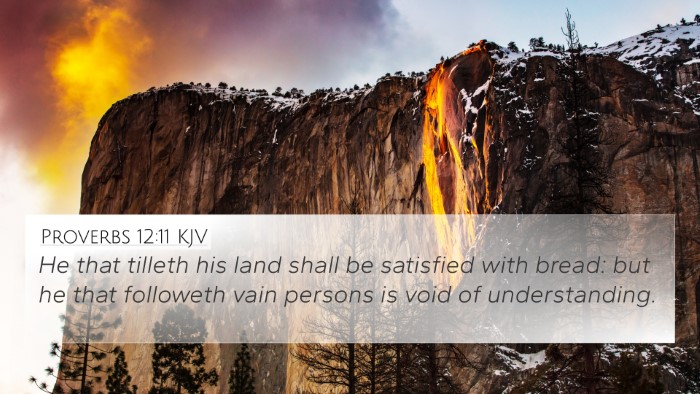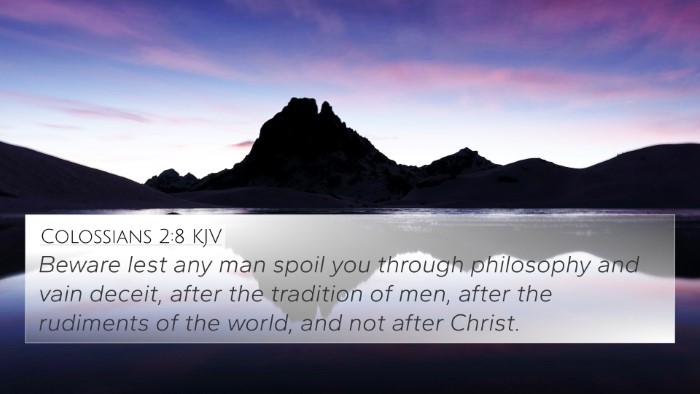Old Testament
Genesis Exodus Leviticus Numbers Deuteronomy Joshua Judges Ruth 1 Samuel 2 Samuel 1 Kings 2 Kings 1 Chronicles 2 Chronicles Ezra Nehemiah Esther Job Psalms Proverbs Ecclesiastes Song of Solomon Isaiah Jeremiah Lamentations Ezekiel Daniel Hosea Joel Amos Obadiah Jonah Micah Nahum Habakkuk Zephaniah Haggai Zechariah MalachiJames 2:20 Similar Verses
James 2:20 Cross References
But wilt thou know, O vain man, that faith without works is dead?
Uncover the Rich Themes and Topics of This Bible Verse
Listed below are the Bible themes associated with James 2:20. We invite you to explore each theme to gain deeper insights into the Scriptures.
James 2:20 Cross Reference Verses
This section features a detailed cross-reference designed to enrich your understanding of the Scriptures. Below, you will find carefully selected verses that echo the themes and teachings related to James 2:20 KJV. Click on any image to explore detailed analyses of related Bible verses and uncover deeper theological insights.

Proverbs 12:11 (KJV) »
He that tilleth his land shall be satisfied with bread: but he that followeth vain persons is void of understanding.

Romans 1:21 (KJV) »
Because that, when they knew God, they glorified him not as God, neither were thankful; but became vain in their imaginations, and their foolish heart was darkened.

James 1:26 (KJV) »
If any man among you seem to be religious, and bridleth not his tongue, but deceiveth his own heart, this man's religion is vain.

Titus 1:10 (KJV) »
For there are many unruly and vain talkers and deceivers, specially they of the circumcision:

Colossians 2:8 (KJV) »
Beware lest any man spoil you through philosophy and vain deceit, after the tradition of men, after the rudiments of the world, and not after Christ.

Galatians 6:3 (KJV) »
For if a man think himself to be something, when he is nothing, he deceiveth himself.

1 Corinthians 15:35 (KJV) »
But some man will say, How are the dead raised up? and with what body do they come?

Jeremiah 2:5 (KJV) »
Thus saith the LORD, What iniquity have your fathers found in me, that they are gone far from me, and have walked after vanity, and are become vain?

Galatians 5:6 (KJV) »
For in Jesus Christ neither circumcision availeth any thing, nor uncircumcision; but faith which worketh by love.
James 2:20 Verse Analysis and Similar Verses
Understanding James 2:20
James 2:20 reads: "But wilt thou know, O vain man, that faith without works is dead?" This verse highlights the necessity of works accompanying one's faith, a theme echoed throughout the New Testament.
Analysis of James 2:20
This verse asserts a crucial principle of Christianity: that genuine faith must manifest through actions. James, the author, vividly contrasts the concept of living faith with a lifeless belief.
Key Themes from Commentaries
-
Matthew Henry's Commentary:
Matthew Henry emphasizes that faith alone, devoid of works, is insufficient. He argues that faith must lead to good works, and without such demonstration, one’s faith can be considered “dead.” Henry highlights the danger of being ‘vain,’ suggesting that mere acknowledgement without action is futile.
-
Albert Barnes' Notes:
Barnes interprets the term "vain man" as denoting a person who is foolish for thinking they can separate faith from action. He points out that true faith is linked indissolubly to practical righteousness and that no one can truly possess faith without fulfilling the commandments through their actions.
-
Adam Clarke's Commentary:
Clarke notes that faith not acted upon is similar to a body without a spirit. He stresses that deeds are the visible expression of inner faith and that a life of belief produces visible fruit in one's actions.
Cross-References to James 2:20
Several biblical verses resonate with the themes presented in James 2:20. These verses provide connections that enhance understanding:
- Romans 3:28: "Therefore we conclude that a man is justified by faith without the deeds of the law." This highlights faith and works but emphasizes justification by faith.
- Galatians 5:6: "For in Jesus Christ neither circumcision availeth anything, nor uncircumcision, but faith which worketh by love." This emphasizes that true faith is active and motivated by love.
- Ephesians 2:8-10: "For by grace are ye saved through faith... unto good works." This passage illustrates the relationship between grace, faith, and resulting works.
- Matthew 7:16-20: "Ye shall know them by their fruits." Here, Jesus teaches the importance of recognizing faith through its fruits, paralleling James' assertion.
- 1 John 2:4: "He that saith, I know him, and keepeth not his commandments, is a liar." This reinforces the notion that true knowledge of God is evident through obedience, mirroring James' argument.
- Luke 6:46: "And why call ye me, Lord, Lord, and do not the things which I say?" This verse echoes the notion that claiming faith requires action.
- Titus 1:16: "They profess that they know God; but in works they deny him." This underscores that faith without works is hypocritical.
The Significance of Faith and Works
Understanding the relationship between faith and works is pivotal in Christian doctrine. Commentators consistently highlight that faith is more than intellectual assent; it is a transformative force that compels action.
Practical Applications
Applying the teachings of James 2:20 involves integrating faith into daily actions:
- Service to Others: Demonstrating faith through acts of kindness and charity.
- Obedience to Scriptural Commandments: Engaging actively with the teachings of Christ and the apostles.
- Community Involvement: Participating in communal projects that reflect Christian values.
Concluding Thoughts
James 2:20 serves as a reminder for believers that faith must be alive and active, expressed through tangible works. The connection between believing and behaving is one of the core tenets of the Christian faith, supporting the overarching narrative of scripture that faith and action are intertwined.
Tools for Deeper Study
For those looking to explore the connections between Bible verses further, a few tools can assist:
- Bible concordance to find where specific words or themes occur throughout the text.
- Cross-reference Bible study guides for thematic explorations.
- Online resources for comparative Bible verse analysis.
By utilizing such tools, readers can engage in deeper explorations of how different scripture sections interrelate, enhancing their understanding of Christian faith and practice.







